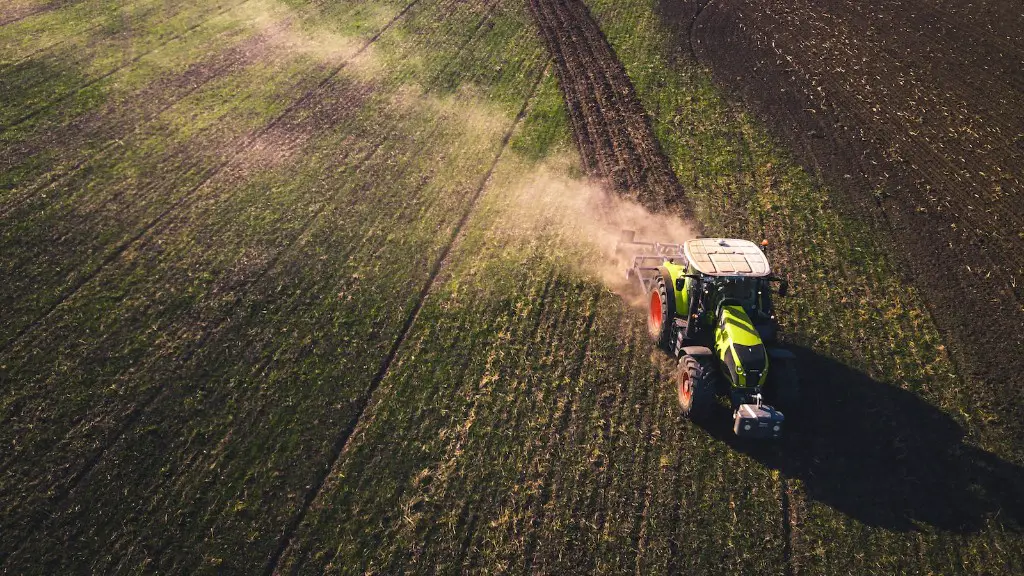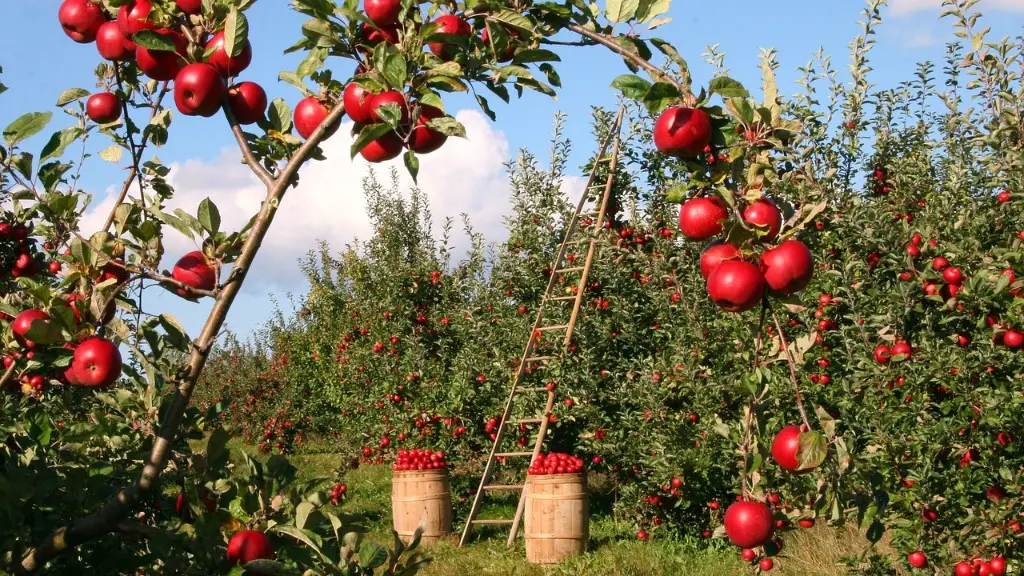Agriculture is big business in the United States. It’s one of the largest single contributors to the nation’s economy, with an annual output of over $1 trillion. Agriculture consists of crops grown for food and fiber, livestock production, and industries associated with these activities. It’s estimated that the agricultural industry directly accounts for 1-2% of the U.S. Gross Domestic Product (GDP).
Agricultural commodities are traded in several forms, most notably in futures contracts. These futures contracts large buyers and sellers to manage the price of a commodity in the future. This helps keep prices stable and predictable, which makes the industry more efficient and profitable.
Agriculture is also important to the U.S. government. The government supports farmers through subsidies, tax breaks, and research. The government also provides $20 billion annually in support for farmers through the Farm Bill. It’s predicted that this amount will increase over the coming years.
The total value of the U.S. agricultural industry is difficult to estimate. The Department of Agriculture puts the value of the industry at over $1 trillion, but this doesn’t take into account other factors such as exports, subsidies, and government support. Regardless, the industry is increasingly becoming a major contributor to the nation’s economy.
The agricultural industry is also important for employment. It directly employs 2.6 million people and indirectly contributes to the employment of 7 million. It also contributes to the employment of those working in various industries which rely on agricultural products, from grocery stores to restaurants, from clothing manufacturers to chemical companies.
Agriculture is also an industry that is quickly changing and adapting to new technology. By embracing technology, products are becoming more efficient and cost-effective. For example, precision farming is a new technology that is revolutionizing the way farmers manage their fields. This technology allows farmers to be more efficient and cost-effective when managing their crops.
Overall, the U.S. agricultural industry is worth a great deal, with an estimated total value of over $1 trillion. It contributes to the U.S. economy, employs millions of people and is quickly adapting to new technology to make the industry more efficient and profitable.
Agriculture and the Economy
Agriculture has a significant effect on the economy of the United States. The industry is one of the four largest contributors to the U.S. Gross Domestic Product (GDP), directly accounting for 1-2%, and indirectly through commodity exports, subsidies, and infrastructure support. As an industry, the total U.S. agricultural economy was estimated to be worth over $1 trillion in 2019.
Agriculture also affects employment and job opportunities in the United States. It’s estimated that the industry directly employs around 2.6 million people and indirectly provides employment opportunities for another 7 million people. It’s also a major source of income for some farmers, with over two-thirds of farmers earning the majority of their income from farming. This income is spent and invested back into the economy, creating a positive economic feedback loop for communities.
In addition, the economic impact of agriculture extends beyond just the United States. American agricultural exports are a major source of foreign income, accounting for over $158 billion in 2018, and supporting over 350,000 jobs in foreign countries. It also helps develop employment opportunities and infrastructure in developing countries.
The agricultural industry also provides essential services to the United States. It helps ensure food security, provides essential nutrients, and helps lead the way in implementing sustainable agricultural practices. To support these goals, the government provides $20 billion annually in support to farmers through the Farm Bill.
The value of the U.S. agricultural industry will continue to be essential to the nation’s economy in the future. It’s estimated that the total value of the industry will reach $2.2 trillion by 2025, with the development of new technologies and an expanding global market for agricultural products.
Agriculture Technology
Agriculture is quickly adapting to new technology, allowing products and services to become more efficient and cost-effective. This has already been seen in the development of precision farming, which uses tracking technologies and data analytics to help farmers make more informed decisions about their crops. This not only helps the farmer, it helps the environment and the economy as a whole.
Other technologies are being developed to improve the efficiency and cost-effectiveness of the agricultural industry. Sensors and drones are becoming more common in the industry, allowing farmers to monitor their land and adjust their tactics as conditions change. Automation and machine learning are also being used to help farmers become more efficient in their practices, while artificial intelligence is being applied to better understand the nuances of the industry.
The development of new technology in the agricultural industry will have a profound effect on the future of the industry and the global economy. It’s estimated that the advancement of technology will lead to an increase in agricultural production, resulting in a $2 trillion boost to the global economy over the next 10 years. This will help to create new jobs, reduce poverty, and reduce the environmental impact of farming.
Agriculture technology will also help to increase transparency, allowing buyers to know exactly where their food is coming from. This will benefit farmers and allow them to compete in a global market, as well as help to reduce fraud in the industry. Additionally, advances in technology will help to reduce the amount of food waste produced, a major environmental issue.
Overall, advances in agriculture technology are transforming the industry and helping it to become ever more efficient, cost-effective, and sustainable. This is essential for the future of the United States and the global economy, and it’s quickly becoming an important factor in the success of the agricultural industry.
Policy Reforms and Agriculture
Agriculture policy is an important factor in the success of the industry. It helps ensure that farmers have the support they need to stay competitive, while also providing necessary help to those who are struggling. In recent years, policy reforms have been put into place to help improve the industry and make it more sustainable.
The Farm Bill is a major policy initiative supported by the U.S. Government. It provides $20 billion annually in support for farmers, and it’s estimated that this amount will increase over the coming years. This helps ensure that farmers have the necessary help to stay competitive in the agricultural industry.
The Farm Bill also helps to provide subsidies for certain goods and services, ensuring that farmers are able to stay afloat in the face of difficult economic conditions. It also provides tax breaks and incentives for farmers, allowing them to reinvest profits back into their businesses. Additionally, the bill provides money for research, helping to drive innovation and technological improvement in the industry.
The government also plays an important role in regulating the industry. This includes setting and enforcing standards to ensure that goods are safe and of high quality, protecting farmers from market manipulation, and providing support for those who are struggling due to extreme weather or circumstances beyond their control.
Overall, policy reform is essential for the success of the agricultural industry. By providing support for farmers and regulating the industry, policy reforms help to ensure the prosperity and sustainability of the industry. This is essential for the economy of the United States and the global economy as a whole.
Conclusion
The agricultural industry is an essential part of the United States economy and global economy. It’s estimated that the total U.S. agricultural industry is worth over $1 trillion, and it contributes to the employment of millions of people each year. The industry is also quickly adapting to new technology, allowing products to become more efficient and cost-effective.
Policy reforms, such as the Farm Bill, are essential in ensuring the success of the industry. This helps to provide support to farmers and ensure that they are able to stay competitive in the marketplace. Additionally, the government plays an important role in regulating the industry, helping to ensure safety and quality of products.
Overall, the U.S. agricultural industry is an essential part of the nation’s and global economy. It provides essential services and products, and it’s a major source of employment for millions of people. It’s also quickly adapting to new technologies, allowing products and services to become more efficient and cost-effective.





